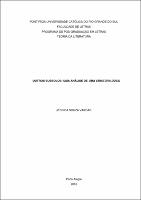| Compartilhe o registro |


|
Use este identificador para citar ou linkar para este item:
https://tede2.pucrs.br/tede2/handle/tede/7121| Tipo do documento: | Dissertação |
| Título: | Outros subsolos : uma análise de Uma criatura dócil |
| Autor: | Vargas, Jéssica Souza  |
| Primeiro orientador: | Theobald, Pedro |
| Resumo: | Sabemos que as produções literárias de Dostoiévski são bastante conhecidas não só em se tratando de literatura russa; considerando a visibilidade de seus romances, boa parte já possui traduções diretas dos originais em russo. Para pensarmos, então, a grande personagem do autor, o homem do subsolo, encontrado sob diversas facetas, elegemos a novela Uma criatura dócil, que traz esse sujeito que paira pela multidão, tentando compreendê-la na medida em que compreende a si mesmo. A proposta desse estudo é evidenciar esse narrador, inconfiável e iludido, que tenta, num solilóquio desesperado, conceber o suicídio da esposa, ação central da novela. A São Petersburgo aparentemente em eterno desenvolvimento parece motivar o problema filosófico da narrativa numa espécie de viagem ao inconsciente, dando a estrutura social necessária que impulsiona o conflito do indivíduo ideológico que tenta fazer-se presente enquanto dialoga com o Outro, também presente. A alteridade da esposa morta é incompreendida pelo marido, apontamentos estes trazidos ao final dessa análise, que propulsiona, em verdade, a negação da singularidade do discurso da mulher, que não pode ser entendida como dócil ou domesticável e que encontra em seu ato final, a morte, uma possibilidade de fuga. Para pensarmos, portanto, as questões relativas ao Eu e ao Outro, recorremos à filosofia primeira de Emmanuel Levinas. Entendendo o indivíduo literário – e social – enquanto incompleto, abordamos as questões relacionadas ao discurso inacabado do sujeito conforme os preceitos de Mikhail Bakhtin e de Leonid Grossman, que trouxeram também argumentos relacionados à composição do gênero novelístico, reelaborado por Dostoiévski. Outros estudiosos foram selecionados para que as ideias levantadas tivessem respaldo e, acima de tudo, para que as hipóteses sobre a manifestação das presenças dos seres através de suas palavras contemplassem o que entendemos por realidade, a mesma realidade estranha engendrada pelo autor, que revela ao leitor duas personagens enclausuradas em seus subsolos, sem saída. |
| Abstract: | It is a fact that Dostoyevsky’s literary work is known worldwide not only when it comes to Russian literature; considering the visibility of his novels, most of them already translated directly from Russian. In order to think the “underground man” – his ultimate character – in all its aspects, we chose A Gentle Creature, a novella that shows a man who floats over the crowd and tries to understand it at the same time as he tries to understand himself. The proposal of the present study is to reveal this unreliable and delusional narrator who, in a desperate soliloquy, struggles to accept his wife’s suicide, the central action of the plot. The apparently always-in-development Saint Petersburg drives a philosophical question – the sinking inside of the human soul – and offers a social structure that pushes the conflict of an individual who tries to make himself present while he dialogues with the Other, who is also present. The alterity of the dead wife cannot be understood by the widower, in observations brought at the end of the analysis which, as a matter of fact, denies the singularity of the woman’s discourse, who cannot be understood as gentle or meak and who in her final act, death, finds a possibility of escape. Therefore, in order to think the Self and the Other, we used Emmanuel Levinas’ first philosophy. Taking this incomplete being as a result of the narrative, we studied aspects related to the subject’s unfinished speech by using concepts of authors such as Mikhail Bakhtin and Leonid Grossman, who also brought ideas about the structure of the novella genre, which was modified by Dostoyevsky. There were other authors selected to give basis to this study’s arguments and, moreover, to guarantee that the individuals (turned into presence through their words) could be a part of what we understand as reality, the same strange reality engendered by the author, who reveals to the reader two characters enclosed in their undergrounds, with no exit. |
| Palavras-chave: | NOVELAS RUSSAS LITERATURA RUSSA - HISTÓRIA E CRÍTICA TEORIA LITERÁRIA LITERATURA |
| Área(s) do CNPq: | LINGUISTICA, LETRAS E ARTES::LETRAS |
| Idioma: | por |
| País: | Brasil |
| Instituição: | Pontifícia Universidade Católica do Rio Grande do Sul |
| Sigla da instituição: | PUCRS |
| Departamento: | Faculdade de Letras |
| Programa: | Programa de Pós-Graduação em Letras |
| Tipo de acesso: | Acesso Aberto |
| URI: | http://tede2.pucrs.br/tede2/handle/tede/7121 |
| Data de defesa: | 29-Mar-2016 |
| Aparece nas coleções: | Programa de Pós-Graduação em Letras |
Arquivos associados a este item:
| Arquivo | Descrição | Tamanho | Formato | |
|---|---|---|---|---|
| DIS_JESSICA_SOUZA_VARGAS_COMPLETO.pdf | Texto Completo | 800,18 kB | Adobe PDF |  Baixar/Abrir Pré-Visualizar |
Os itens no repositório estão protegidos por copyright, com todos os direitos reservados, salvo quando é indicado o contrário.




